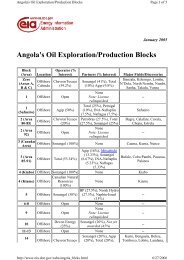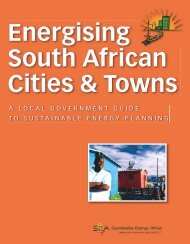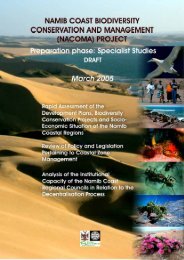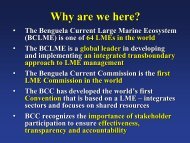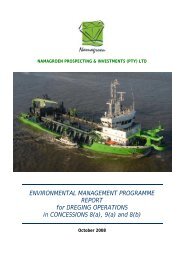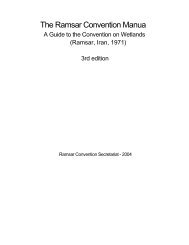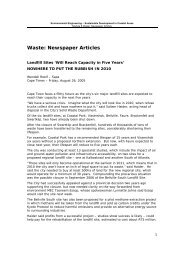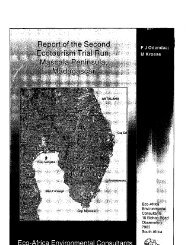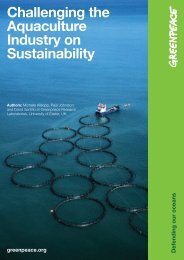Feasibility Study of Proposed Tourism Dev in Shewula, NE ...
Feasibility Study of Proposed Tourism Dev in Shewula, NE ...
Feasibility Study of Proposed Tourism Dev in Shewula, NE ...
Create successful ePaper yourself
Turn your PDF publications into a flip-book with our unique Google optimized e-Paper software.
Chapter 7 - Conclusions<br />
pose significant impediments to achiev<strong>in</strong>g efficient and effective project plann<strong>in</strong>g,<br />
implementation and operation.<br />
7.1.2.2. Project strengths aris<strong>in</strong>g from the plann<strong>in</strong>g process to date<br />
The fact that there is significant commitment from the leadership <strong>in</strong> <strong>Shewula</strong> to see<br />
the project become a reality, and that there has been <strong>in</strong>tensive <strong>in</strong>volvement <strong>of</strong> a few<br />
members <strong>of</strong> <strong>Shewula</strong> (notably those represented on the <strong>Shewula</strong>-Mbuluzi-Mlawula<br />
Trust) <strong>in</strong> the plann<strong>in</strong>g <strong>of</strong> the proposed projects is a significant strength <strong>of</strong> the project.<br />
So too, is the <strong>in</strong>volvement <strong>of</strong> local l&APs and neighbour<strong>in</strong>g properties. There is also<br />
government support for the <strong>in</strong>itiative, and a degree <strong>of</strong> <strong>in</strong>terest has been expressed by<br />
some representatives <strong>in</strong> the private sector.<br />
In order to undertake the necessary research for the current study a more<br />
participatory plann<strong>in</strong>g process was implemented, which encouraged greater<br />
participation <strong>of</strong> the <strong>Shewula</strong> community. Dur<strong>in</strong>g the fieldwork, feedback was obta<strong>in</strong>ed<br />
and relayed between the various l&APs. To some extent, the problems <strong>of</strong> lack <strong>of</strong><br />
communication and lack <strong>of</strong> access to <strong>in</strong>formation were, therefore, partially overcome;<br />
and the positive responses <strong>of</strong> will<strong>in</strong>gness and enthusiasm that were expressed to<br />
cont<strong>in</strong>ue this participation, is an opportunity to strengthen the project.<br />
7.1.3. Issues related to the envisaged tourism product<br />
7.1.3.1. Constra<strong>in</strong>ts<br />
There are several problems related to the conceptualisation <strong>of</strong> the project, which are<br />
pert<strong>in</strong>ent to an assessment <strong>of</strong> the projects' feasibility. These <strong>in</strong>clude:<br />
1. The lack <strong>of</strong> a f<strong>in</strong>alised concept plan (<strong>in</strong>clud<strong>in</strong>g the details <strong>of</strong> the project design<br />
and the operational model)<br />
2. The lack <strong>of</strong> a strategic plann<strong>in</strong>g process. This has resulted <strong>in</strong> the lack <strong>of</strong> a<br />
number <strong>of</strong> essential plann<strong>in</strong>g and management tools, <strong>in</strong>clud<strong>in</strong>g:<br />
• A strategic plan for the area as a whole (such as might be required by<br />
the Lubombo Conservancy for tourism development and conservation<br />
management);<br />
• A management plan for the <strong>Shewula</strong> area <strong>in</strong> particular (encompass<strong>in</strong>g<br />
both the conservation / natural resources management and the tourism<br />
management components);<br />
• A market<strong>in</strong>g study, which would help to p<strong>in</strong>po<strong>in</strong>t the requirements that<br />
must be met by the project for it to be a feasible bus<strong>in</strong>ess venture, and<br />
would provide the necessary <strong>in</strong>put required for the f<strong>in</strong>alisation <strong>of</strong> the<br />
concept plan, thereby elim<strong>in</strong>at<strong>in</strong>g some <strong>of</strong> the problems that have<br />
contributed to the situation develop<strong>in</strong>g as described <strong>in</strong> bullet 1 above.<br />
The f<strong>in</strong>alisation <strong>of</strong> the concept plan is a prerequisite for effective project<br />
implementation. The current assessment <strong>of</strong> the project's feasibility, particularly <strong>in</strong><br />
terms <strong>of</strong> f<strong>in</strong>ancial and bus<strong>in</strong>ess feasibility, has been impeded by a lack <strong>of</strong> specifics on<br />
the exact project plan. Of greater significance, however, is the possibility that the<br />
concept plan could be f<strong>in</strong>alised without due consideration <strong>of</strong> the broader context <strong>of</strong><br />
the project and without the necessary market analysis, natural resource management<br />
and tourism plann<strong>in</strong>g. This could pose a serious threat to the feasibility <strong>of</strong> the project.<br />
Although it may seem necessary, <strong>in</strong> view <strong>of</strong> time constra<strong>in</strong>ts, hasty decision-mak<strong>in</strong>g<br />
could have the potential to negatively impact the project's ultimate long-term<br />
feasibility.<br />
154



